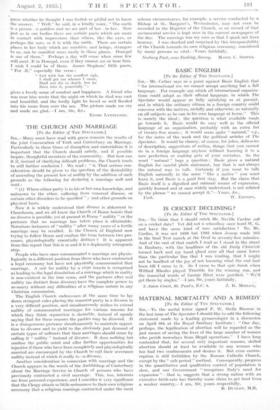THE CHURCH AND MARRIAGE
[To the Editor of THE SPECTATOR.] Sin, Many must have read with grave concern the results of the joint Convocation of York and Canterbury on Marriage. Particularly in these times of disruption and materialism it is important that the Church should satisfy, and if possible 'inspire, thoughtful members of the community. But how can it if, instead of clarifying difficult problems, the Church tends to still further confusion ? We read : " 0. That serious con- sideration should be given to the question of the desirability of amending the present law of nullity by the addition of such grounds as the" following for declaring a marriage null and 'void :
(1) Where either party is to his or her own knowledge, and unknown to the other, suffering from venereal disease, or certain other disorders to be specified " ; and other grounds on physical basis.
Now it is widely understood that divorce is abhorrent to Churchmen, and we all know the Church of Rome boasts that no divorce is possible; yet at present in Rome " nullity " or the pretence that no marriage has taken place is obtainable. Notorious instances of " nullity " after many years of a fertile marriage may be recalled. Is the Church of England now trying tofollow Rome and confuse the issue between two pro- cesses, physiologically essentially distinct ? It is apparent from this report that this is so and it is a deplorably retrograde step.
People who have once consummated a marriage are physio- logically in a different position from those who have contracted a legal ceremony but have not physically consummated that marriage. A suit for nullity by a virgo intacta is recognized as leading to the legal dissolution of a marriage which in reality is non-existent in the true sense, and the partners after real nullity (as distinct from divorce) have the 'complete power to re-marry without any difficulties of a religious nature in any Christian communion.
The 'English Church endeavours at the same time to lay down stringent rules placing the innocent' party in a divorce in a very difficult position, and simultaneously wishes to extend nullity of consummated marriages for .various reasons - for which they think separation is desirable, instead of openly saying that for these' reasons the parties may be divorced. It is a disingenuous pretence simultaneously to maintain opposi- tion to divorce and to . yield to the obviously just demand of certain types of sufferers that their marriages should cease by calling it." nullity " instead of divorce. It does nothing but confuse the public mind and offer further opportunities for injustice if those who have been completely and physiologically married are encouraged by the Church to call their severance nullity instead of which it-really is,---adivorce. , , • • Another consideration in .eonnexion, with marriage and the Church appears in the words of the Archbishop of Canterbury about the Marriage Service .in Church of persons who have previously contracted a . civil marriage. This, too, interests me from personatexperience, and I consider it very significant that the Clergy attach so little-seriousness-to their own religious ceremony that a 'religious marriage contracted under the most
solemn circumstances, for example, a service conducted by a Bishop at St.. Margaret's, „Westminster, may ,not even be recorded in the Register of the Church, so no record of that sacramental service is kept save in the current newspapers of
the day. The marriage was my own so that I speak from hearsay. I was shocked and surprised by this irresponsibility of the Church towards its own religious ceremony, considered by many persons so vital.—Yours faithfully, Norbury Park, near Dorking, Surrey. MARIE C. STorEs.






































 Previous page
Previous page